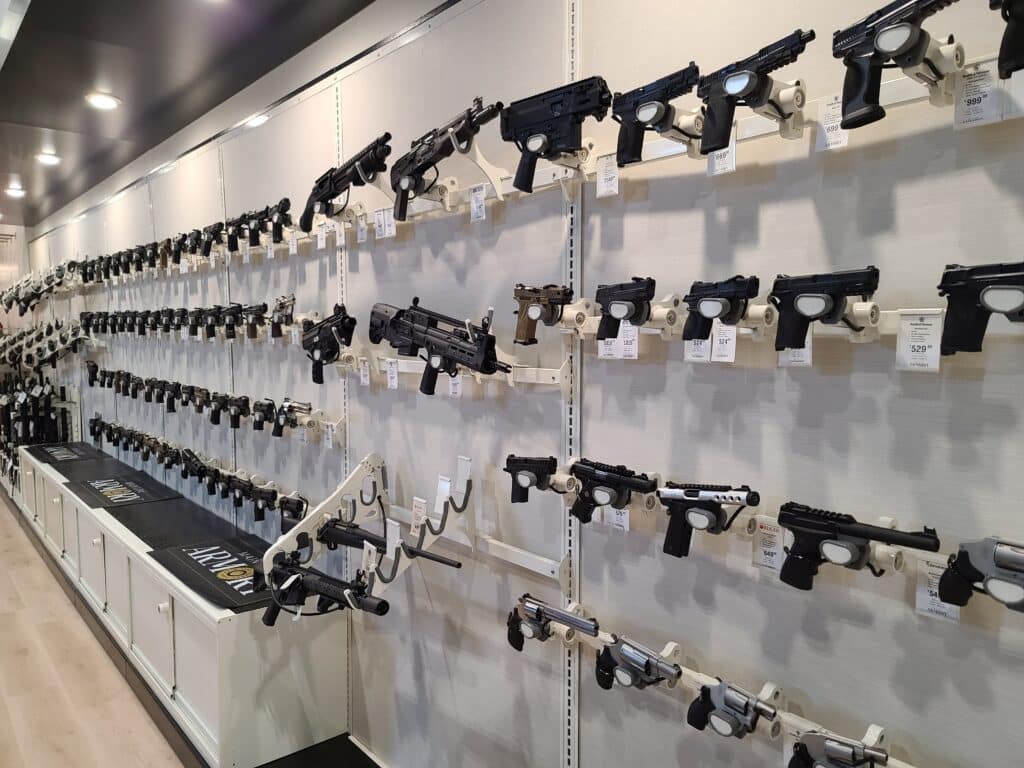The Supreme Court’s next big gun case is set to be heard at the beginning of next month. So, we’re continuing our in-depth examination of the arguments in the case.
One of the arguments that’s gotten a lot of attention revolves around whether Zackery Rahimi was afforded the proper due process protections before his gun rights were stripped by a domestic violence restraining order. Unlike most other briefs in his defense, the Cato Institute’s brief with the Court revolves entirely around this question. I sum up what it said in our first piece.
Then we have Second Amendment Scholar David Kopel on the podcast to explain how one word makes the domestic violence restraining order gun ban unconstitutional. Both Cato and Kopel argue the flaws with the way the law was written and the process of limiting Rahimi’s gun rights could probably be fixed. But, ultimately, they argue that isn’t the job of the Court, and it should find the law as it stands unconstitutional.
Plus, Contributing Writer Jake Fogleman explains the difference between Massachusetts’ first attempt at a Bruen-response bill and its latest one.

Analysis: The Due Process Defense of Rahimi [Member Exclusive]
By Stephen Gutowski
Due process is always essential whenever somebody’s unalienable rights are at stake. Concerns over process have taken center stage in many debates about gun laws in recent years, especially in the fight over red flag laws.
Now, complaints over the lack of due process protections are also at the center of the Supreme Court’s latest gun case.
While Rahimi has focused on the lack of similar historical laws barring gun ownership by people accused of domestic violence and other Second Amendment advocates have focused on problems with how the modern prohibition is written, the Cato Institute is focused on the process involved. In its amicus brief, the libertarian think tank said people who commit domestic violence should be kept away from firearms, but only if the process for taking their gun rights is sound.
“The right of women to be free from physical abuse at the hands of men has received short shrift throughout our nation’s history,” the Cato Institute wrote. “And so has the right of the people to keep and bear arms. This case presents those rights in direct—but not insoluble—conflict. Contrary to the maximalist positions of opposing partisans, our nation’s traditions present no obstacle to disarming genuinely dangerous people and abundant guidance for how to accomplish that result with due regard for the fundamental rights of all concerned. But doing so will require fresh legislation, because § 922(g)(8) is both historically anomalous and legally deficient in failing to ensure an adequate measure of procedural due process.”
Cato argued the federal prohibition doesn’t require much in the way of protection for the accused’s Second Amendment rights before they can be stripped.
“[A]ll that § 922(g)(8) requires is notice of the proceeding and an opportunity to participate, together with either an express finding of dangerousness or an explicit prohibition of the use or threatened use of force against an intimate partner or child,” the group said. “Notably, there is no requirement that respondents be advised beforehand that issuance of the order will render it unlawful for them to possess firearms; no requirement that they be provided with counsel; no requirement that the issuing court make any specific factual findings; and no provision for a heightened standard of proof, as this Court has held is constitutionally mandated ‘when the individual interests at stake in a state proceeding are both ‘particularly important’ and ‘more substantial than mere loss of money.'”
It argued the law was before the Court had commented on the extent of the right to keep and bear arms and that meant Congress and lower courts treated it as more of a privilege when considering what kind of legal process would be necessary to restrict or even remove it. Since the Court has now opined on the scope of the Second Amendment, Cato argued it should ensure any attempts to deprive somebody of their gun rights should be accompanied by a much higher standard of process protections.
“Indeed, so fundamental is the norm of proportionality between the magnitude of an individual’s exposure and the quality of the process to which they are constitutionally entitled that it is reflected not just in civil cases but in criminal prosecutions as well,” the group wrote. “Thus, the Court has held that there is no right to court-appointed counsel when the defendant is not facing potential incarceration, Scott v. Illinois; that there is a right to court-appointed counsel but not a jury trial for ‘petty’ offenses where the maximum punishment is six months or less of incarceration, Baldwin v. New York; and that there is a right both to court-appointed counsel and to a jury trial for ‘serious’ crimes with a potential sentence of more than six months.”
Cato argued the Court traditionally balances the affected right and the risk the procedures used could lead to erroneous decisions against how useful added protections could be and how much those protections would burden the government.
It said the Court has already found the right to keep and bear arms is fundamental. And it argued that right isn’t completely forfeited even when somebody commits domestic abuse.
“Reprehensible as the physical abuse of an intimate partner certainly is, perpetrators of domestic violence do not thereby forfeit entirely their fundamental right of self-defense,” the group wrote, “though the means of effectuating that right may doubtless be curtailed to some extent by an appropriately tailored law.”
It argued the current process is ripe for abuse, and sometimes results in those who are abused being deprived of their gun rights. The group also said the burden of providing a higher standard of process would be mostly minimal, though it did say providing court-appointed representation for poor defendants would be moderately burdensome.
The Cato Institute pointed to the rarity of domestic violence restraining orders being challenged as further evidence of due process issues. It argued there is reason to believe many under these orders don’t understand their true impact and can’t afford to challenge them anyway.
“While it is true that Section 922(g)(8) requires actual notice and an opportunity to participate in the hearing to determine whether a civil protective order will issue, it is doubtful whether the opportunity to participate is a truly meaningful one when there is no requirement that the respondent be informed about the true stakes of that hearing (immediate suspension of Second Amendment rights), no compelling reason for most people to vigorously challenge the issuance of an order commanding them not to do something illegal or unethical, and in some cases strong countervailing incentives to participation, including exposure to attorney’s fees,” the group wrote.
While Cato argued the deficiencies in the law could be fixed, it also said that isn’t the Court’s job.
“For now, it is enough to say that the threadbare procedures set forth in § 922(g)(8) would be considered woefully inadequate to support the abrogation of other fundamental rights such as the ability to petition the government for redress of grievances by attending a city council meeting, or accessing the Internet, or traveling about the country,” the group wrote. “The right of armed self-defense is no less important and no less entitled to an appropriate measure of procedural due process.”
The Cato Institute concluded the goal of the federal prohibition against people under domestic violence restraining orders owning guns is good but the means of getting there aren’t constitutional.
“The policy goals embodied in § 922(g)(8) are vital, and Congress should have both the opportunity and the impetus to advance those goals in a constitutionally compliant statute that is consistent both with the nation’s tradition of gun regulation and with the requirements of procedural due process,” the group wrote. “Accordingly, the judgment below should be affirmed.”
Podcast: Second Amendment Scholar David Kopel on the Supreme Court’s Latest Gun Case [Member Early Access]
By Stephen Gutowski
This week, we’re turning our attention back to the Supreme Court. It is deciding the first gun case since its landmark decision last year. And we have one of the most influential Second Amendment scholars in the country on the show to discuss it.
David Kopel joins the podcast to explain his amicus brief in United States v. Rahimi. He is one of the most accomplished scholars on the topic. His work has been cited in countless federal court decisions and all of the Supreme Court’s major Second Amendment rulings.
In Rahimi, Kopel argued the federal law barring those under domestic violence restraining orders from owning guns is unconstitutional. He said the problem lies in a provision that doesn’t require any finding that the subject of the restraining order is dangerous. But he also noted the problem could be fixed with a single word being changed.
He argued Rahimi is the kind of person who should be barred from owning guns. However, he said the law doesn’t pass the Court’s history and tradition test as it is currently written.
Plus, Contributing Writer Jake Fogleman and I explain how Israel is loosening its gun laws in the wake of terror attacks.
You can listen to the show on your favorite podcast episode or by clicking here. Video of the episode is also available on our YouTube channel. Reload Members get access on Sunday, as usual. Everyone else can listen on Monday.

Analysis: How the Massachusetts’ Bruen-Response Bill Has Changed [Member Exclusive]
By Jake Fogleman
Massachusetts lawmakers are back with another attempt to pass sweeping gun legislation and blunt the effects of the Supreme Court’s Bruen decision. As with its failed previous effort, the new proposal aims to go much further than any other state’s efforts.
Massachusetts Representative Michael Day (D.) introduced HD 4607 last week. The bill replaces HD 4420—a sweeping 140-page bill its critics dubbed the “Lawful Citizens Imprisonment Act.” Its onerous regulations ultimately proved too controversial for even the state’s supermajority Democratic-controlled House to advance. Now, Day is back with a new bill, ostensibly meant to address some of the concerns critics had with his original effort, but no less aimed at the High Court.
“The U.S. Supreme Court, too, under the sway of a new conservative majority, has weakened gun safety laws and made it easier for millions of Americans to carry and use guns in public,” Day wrote in an Op-ed touting his bill published with Massachusetts House Speaker Ron Mariano (D.). “We believe the Supreme Court’s recent decision was dangerous, and that we can and must do more in Massachusetts.”
It’s worth examining how different the new proposal is from the initial effort.
Carry Restrictions
The provisions aimed at cracking down on public carry, essentially the crux of Bruen-response bill efforts, remain largely unchanged in HD 4607 from the previous bill.
As part of the carry permit application process, the bill would keep the state’s current application fee of $100 in place and specify that permits are valid for six years. It would also incorporate live fire and a written exam into the training requirements an applicant must meet before applying for a license.
The exact specifications of the training course would be left to the Massachusetts State Police to establish via rulemaking at a later date. It would also appear to allow for some discretion on the part of licensing authorities to determine the “unsuitability” of a permit applicant based on evidence suggesting the applicant “may create a risk to public safety.”
The bill also creates many new sensitive places where licensed carry is prohibited, similar to those enacted in New York, New Jersey, Maryland, Hawaii, and California. It would make it a crime punishable by up to $1,000 in fines and two and a half years in prison to possess a firearm, loaded or unloaded, on the grounds or parking areas of any government building, polling place, or educational institution. It would do the same for any publicly accessible private property, such as a store or restaurant, unless the owner affirmatively provides consent for licensed carry on the premises.
In some ways, the proposed restrictions are less onerous than the gun-free zones passed by other states that had their carry laws struck down by the Supreme Court—though they remain far more strict than most states.
Extreme Risk Protection Order Expansion
Perhaps the most significant change in the updated gun-control bill is the inclusion of a major expansion of the state’s already-existing statute allowing a person to have their guns confiscated if a judge determines they are a threat to themselves or others.
Under current law, only family members or law enforcement are permitted to file a petition with a judge. HD 4607 would expand that to allow licensed physicians, registered nurses, licensed practical nurses, certified nurse practitioners, certified clinical nurse specialists, certified psychiatric clinical nurse specialists, licensed psychiatrists, licensed psychologists, licensed mental health counselors, licensed marriage and family therapists, licensed independent clinical social workers, licensed certified social workers, a principal or assistant principal of an elementary school or secondary school, administrators of a college or university where the respondent is enrolled, and employers to file petitions as well.
The petition provides the option for an emergency order in which the respondent would not be notified of the filing and could have their firearms and ammunition confiscated for up to 10 days before a judge has ever heard the case. There is no right to court-provided legal counsel for the accused. However, the bill’s language stipulates that filers of false or malicious petitions could face up to $5,000 in fines and up to two and a half years in prison.
Banning “Assault-Style Firearms” and Magazines
Much like HD 4420, the new bill would expand the state’s restrictions on so-called assault-style weapons by broadening the state’s definition of banned guns to include any semi-automatic rifle, pistol, or shotgun that can accept a detachable magazine and has one or more listed cosmetic features, any “semiautomatic version of any fully automatic firearm,” any “automatic part,” and an extensive list of hundreds of firearms listed by make and model. The state’s previous ban merely listed banned “assault weapons” by make and model, in addition to prohibiting any “copies or duplicates” of said guns as determined by the discretion of the Attorney General.
However, unlike bill 4420, HD 4607 provides a grandfathering option for owners of the newly banned weapons provided that the owner possesses the firearms before August 1, 2024, has a valid license to carry, and registers the covered weapons with the state. “Large capacity” magazines, defined as those capable of holding more than ten rounds, are banned unless they were continuously owned before September 13, 1994. Grandfathered magazines would only be able to be used on private property or at licensed gun ranges.
The Rest
The remainder of the controversial provisions from the initial bill, namely those related to so-called ghost guns, gun registration requirements, “smart gun” mandates, safe storage requirements, and changes to permit-to-purchase procedures that essentially ban adults under the age of 21 from purchasing any semi-automatic long gun all appear to have carried over to this latest bill in nearly identical format from HD 4420.
The updated bill, ostensibly created to be more palatable to critics of the initial effort, primarily traded minor grandfathering allowances for certain semi-automatic weapons in exchange for a massive expansion of the state’s red-flag law. Expect the widespread backlash from gun-rights advocates to be just as intense this time around.
That’s it for now.
I’ll talk to you all again soon.
Thanks,
Stephen Gutowski
Founder
The Reload






